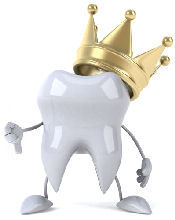If you are in need of emergency dental care, it is important to be able to answer these questions when you call our dentists:
1.) How long has it hurt?
2.) What makes it hurt?
3.) How much does it hurt?
4.) Does it keep you awake at night?
5.) Have you been taking anything for the pain? If so, what?
6.) What is the location of the tooth and the pain?
7.) What symptoms are you having (swelling, fever, pain)?
We will need to know this information to determine the type of emergency treatment you require. Make sure to follow up on what we tell you and to attend your return appointment. We encourage you to bookmark this page so that you can easily return in the case of an emergency.
With regular dental visits and by following our recommendations for treatment, rarely do any of our patients experience a dental emergency. However, certain events can be unforeseen.
Dental Emergencies
Fractured Jaw
If your jaw hurts when it is moved or you cannot close your mouth in a normal manner, immobilize the jaw with a towel or tie. Call your dental  office immediately, or in the case of trauma, go to your nearest emergency room.
office immediately, or in the case of trauma, go to your nearest emergency room.
Infection and Swelling
There is a difference between inflammation and infection. Slight reddening of the gum tissue and swelling of the gum tissue can indicate inflammation, a less urgent condition. Minor puncture wounds or lacerations to the check, lips or tongue will often heal on their own but severe pain or bleeding will require more immediate care. More severe swelling, swelling in the face, neck or cheeks or the presence of pus indicates an infection that requires immediate attention.
Infection can be from the gums requiring periodontal treatment or it can indicate an infected tooth that would require root canal treatment. Infection requires antibiotics as soon as possible. Severe infection sometimes requires hospitalization which would involve your medical doctor or the emergency room. If you feel that your infection should be seen by a dentist, call your Dental Health office. If you feel you have a more serious dental emergency, go to your nearest emergency room.
Remember, antibiotics do not fix the problem, they merely help contain the infection until treatment can be administered.
Inflamed Gums
An area of swollen gums may be a minor area of localized inflammation/trauma or it may be a sign of a more serious periodontal problem. Inflammation that is associated with swelling of the face is considered a dental emergency and should be dealt with promptly.
Inflammation not associated with swelling of the face can often be taken care of with regular checkups and excellent home care. Here is a brief checklist of what to do at home if you are having inflamed and painful gums:
1.) Rinse the area with warm salt water to flush it out
2.) Make sure there is no debris that may be causing the discomfort.
3.) Consider traditional over-the-counter pain relievers such as aspirin, acetaminophen (Tylenol), and Ibuprofen (Motrin, Advil, Nuprin) that may help curb the pain.
4.) Do not place any of these pain medications directly on the tooth or gum. This can cause serious burns and inflammation.
If you are having pain or swelling in your gums, we highly recommend coming in for an exam. You can read more on our Gum Health page and visit our schedule page to be seen by one of our dentists.
Knocked Out Tooth
A knocked out tooth is a common accident, especially among children, sports related activities and even on the road. In the US alone, almost five million teeth get knocked-out from the mouth every year. Ninety percent of these teeth could have been saved and reinserted back if proper preservation techniques have been used during the time of the incident.
1.) Do not scrub or clean the tooth.
2.) Place the tooth in a container of milk. Clean water may also be used.
3.) Call immediately to be seen by your dentist and bring your tooth with you.
 While your nearest Dental Health Colorado dentist is always available for emergencies such as this, if you are out of the area, time is of the essence so find a dentist nearest to your location.
While your nearest Dental Health Colorado dentist is always available for emergencies such as this, if you are out of the area, time is of the essence so find a dentist nearest to your location.
Lost Filling
Normally a loose or lost filling is an indication of new decay that will require treatment. Often the exposed inner portion of the tooth will be sensitive to hot or cold. Covering the area with soft wax or using over the counter temporary filling material from the pharmacy can stop the pain. Clove oil on a pellet of cotton can be applied to a more painful area of a tooth. Be sure that you do not apply this to your gum tissue.
Lost or Loose Crown
As long as the crown is in place, the inner part of the tooth will be covered and protected. If possible, try to put the crown back on the tooth. Over the counter temporary cement is available at the pharmacy. Do not use super glue. You can make your own cement with a smooth mixture of Vaseline and corn starch (or you can use toothpaste- just paste, gel will not work). Make sure the tooth and crown are cleaned out. If you feel that the crown is still not secure, please place it in a protected place to bring with you to your next appointment. It is better to take it out and wait to be seen, then to possibly swallow it.
Lost Denture Tooth
A denture tooth that comes off your denture can be embarrassing if it is a visible tooth. However, you should avoid using super glue to make a repair. The can become more problematic because you may have difficulty re-fitting the tooth, making a professional repair more difficult. If you had a special event, such as a marriage, then super glue might be in order but it would be better to wait a day or so and have it professionally repaired.
If you break your full or partial denture, be sure and keep all the pieces as they can often be repaired. For more information, visit our dentures page.
Orthodontic Problems
If a wire or loose bracket is causing an irritation, cover the end of the wire with some wax or a piece of gauze. Do not wait for your next orthodontic appointment as this will only delay treatment and prolong the discomfort. Contact your orthodontist immediately so that they can address your needs and make the necessary corrections.
Further Information
The American Dental Association has provided further information on how to treat dental emergencies. You can click on their emergency dental page for more information.